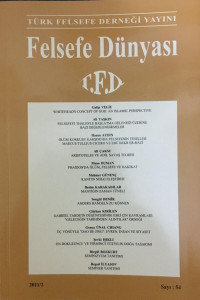Abstract
Bilindiği gibi insanı ilgilendiren en temel sorunlardan birisi ölüm korkusudur.
Bu nedenle olsa gerek, geçmişte günümüze, farklı kültürel çevrelerde,
dinlerin, teologların ve filozofların ölüm korkusunu yenmek için dinsel ya da
felsefî çözüm önerileri içeren kuramlar geliştirdikleri gözlenir. Özellikle felsefi
düşünce içerisinde, Batı’da Sokrates, Platon, Epiküros, Cicero, Augustinus,
Descartes Hedegger, Doğu’da ise, Kindi, Fârâbî, İhvân es-Sâfâ, Ebû Bekr er-
Râzî, İbn Sînâ, Gazzâlî, Molla Sadra gibi filozofların ölüm ve ölüm korkusu
sorununu özel olarak ele aldıkları, sorunu felsefî bir düzlemde tartıştıkları ve
hatta ölüm korkusunu yenme konusunda insanlar için felsefi çözümler ve teselliler
geliştirdikleri görülür. Felsefe tarihinde ileri sürülen bu felsefi çözümlere
ve tesellilere bakıldığında, iki temel yaklaşımla karşılaşıldığını söyleyebiliriz:
Bir tarafta ölümle ruhun dağılıp yok olduğunu düşünen materyalistler, diğer
tarafta ise, ölümden sonra, bedenden bağımsız olarak ruhun yaşadığına inanan
idealistler yer alır. Kimi filozoflar, sözgelimi Cicero ve Ebû Bekr er-Râzî, hem
idealist hem de materyalistlerin ölüm ve ölüm korkusuna yaklaşımlarını ele almakta,
her iki grup için de, ölüm korkusunu yenme konusunda felsefi teselliler
sunmaktadırlar. Her iki düşünürün soruna yaklaşımları irdelendiğinde oldukça
benzer söylemler geliştirdikleri gözlenir. İşte biz bu makalede, Cicero ve Ebû
Bekr er-Râzî’nin ölüm korkusu sorununa yaklaşımlarını çözümlemeyi ve iki
düşünürün soruna yaklaşımlarındaki benzerlikleri göstermek amacıyla görüşlerini
karşılaştırmayı hedefliyoruz.
Keywords
Ölüm Ölüm korkusu ölüm korkusunu yenmek için teselliler ruh Latin felsefesi İslam felsefesi.
References
- Alon, Ilai, “Socrates Medieval Arabic Literature”, Journal of the History of Philosophy, 32/1, 1994.
- Arslan, Ahmet, İlkçağ Felsefe Tarihi (Plotinus, Yeni Platonculuk ve Erken Dönem Hıristiyan Felsefesi), Bilgi Üniversitesi Yayınları, İstanbul 2010.
- Bedevi, Abd er-Rahmân, Min Târîh el-İlhâd fî el-İslâm, Kahire 1993.
- Badham, Paul, “Ölüm ve Ölümsüzlük: Global Bir Senteze Doğru”, çeviren: Cafer Sadık Yaran, Klasik ve Çağdaş Metinlerle Din Felsefesi, Etüt Yayınları, Samsun 1997.
- Garces, Kathleen -Foley, Death and Religion in a Changing Word, New York 2006.
- Bottero, J., Gılgamış Destanı (Ölmek İstemeyen Büyük İnsan), çeviren: Orhan Suda, YKY, İstanbul 2005.
- Cicero, M. T., Tusculan Disputations, trs.: A. P. Peabody, Cambridge 1886.
Abstract
As it’s known, one of the most important concerns of human beings is the
problem of the fear of death. For this reason, religions, theologians and philosophers
-from past to the present, from different cultural circles- have put forward
religious or rational theories for treatment of this fear. Especially, philosophers,
for example in west philosophy Socrates, Plato, Epicuros, Cicero, Augustinus,
Descartes, Heidegger etc., east philosophy al-Kindi, al-Farabi, Ebû Bakr al-
Razi, Avicenna, al-Ghazzali, Molla Sadra etc., had discussed death and fear of
death a rational-philosophical perspective and had suggested to human beings
philosophical remedies and consolations in this problem. If we look at these
philosophical remedies and consolations in the history of philosophy, we encounter
two approaches: On the one hand are the materialists, who argue that
the soul dissolves at death, and on the other hand are the idealists, who argue
that the soul lives on independent of the body in some form after death. Some
philosopher, for instance Cicero and Abu Bakr al-Razi, analyze both materialist
and idealist approaches to death and suggest rational justifications to overcome
the fear of death. In this article, we aim to analyze and compare Marcus Tullius
Cicero (106 BC–43 BC) and Abu Bakr al-Razi’s (865 BC– 925 BC) views
about treatment of fear of death.
Keywords
Death fear of death consolations of fear of death soul Latin philosophy Islamic philosophy.
References
- Alon, Ilai, “Socrates Medieval Arabic Literature”, Journal of the History of Philosophy, 32/1, 1994.
- Arslan, Ahmet, İlkçağ Felsefe Tarihi (Plotinus, Yeni Platonculuk ve Erken Dönem Hıristiyan Felsefesi), Bilgi Üniversitesi Yayınları, İstanbul 2010.
- Bedevi, Abd er-Rahmân, Min Târîh el-İlhâd fî el-İslâm, Kahire 1993.
- Badham, Paul, “Ölüm ve Ölümsüzlük: Global Bir Senteze Doğru”, çeviren: Cafer Sadık Yaran, Klasik ve Çağdaş Metinlerle Din Felsefesi, Etüt Yayınları, Samsun 1997.
- Garces, Kathleen -Foley, Death and Religion in a Changing Word, New York 2006.
- Bottero, J., Gılgamış Destanı (Ölmek İstemeyen Büyük İnsan), çeviren: Orhan Suda, YKY, İstanbul 2005.
- Cicero, M. T., Tusculan Disputations, trs.: A. P. Peabody, Cambridge 1886.
Details
| Primary Language | Turkish |
|---|---|
| Subjects | Philosophy |
| Journal Section | Research Articles |
| Authors | |
| Publication Date | December 15, 2011 |
| Submission Date | September 13, 2011 |
| Published in Issue | Year 2011 Issue: 54 |
Philosophy World is licensed under a Creative Commons Attribution-NonCommercial 4.0 International License.


